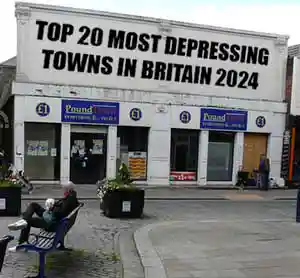Is Lower Street in North Norfolk a nice place to live or is it a bit rough? We have collated a series of socio-economic statistics and demographics from UK government sources such as the 2021 Census and the Index of Multiple Deprivation. They should give you a broad snapshot of the area and the surrounding locations. Are the residents of Lower Street older than the national average or younger? What is the population of Lower Street and North Norfolk? What is the claimant count in Lower Street and how many residents are unemployed? This page should provide you with the answers.What are the occupations of the residents of Lower Street?
The largest employment sector in Lower Street is Managers, Directors & Senior Officials. The smallest employment sector is Elementary Occupations.| Sector | Proportion |
|---|
| Managers, Directors & Senior Officials | % |
| Professional Occupations | % |
| Associate Professional & Technical | % |
| Administrative & Secretarial | % |
| Skilled Trades | % |
| Caring, leisure & Other Services | % |
| Process Plant & Machine Operatives | % |
| Elementary Occupations | % |
Lower Street & Immigration Statistics
We have analysed the Census 2021 raw data on country of birth and compiled immigration statistics as percentages of the population. All percentages have been rounded to two decimal places. Below are the figures for Lower Street in the local area district.
| Area | Born in UK | Born outside UK |
|---|
| 0% | 0% |
|---|
| 0% | 0% |
|---|
| 0% | 0% |
|---|
| 0% | 0% |
|---|
Lower Street compared to other wards in
| # | Ward | Born in UK | Born outside UK |
|---|
';Lower Street is ranked out of 0 wards in for the number of residents born outside of the UK.Lower Street Health Statistics
| Area | VG | G | F | B | VB |
|---|
| 0% | 0% | 0% | 0% | 0% |
| 0% | 0% | 0% | 0% | 0% |
| 0% | 0% | 0% | 0% | 0% |
| 0% | 0% | 0% | 0% | 0% |
VG = Very Good, G = Good, F = Fair, B = Bad & VB = Very Bad
Lower Street Education Statistics
We have taken the raw data from the 2021 census to found of the level of education Lower Street residents have in terms of formal qualifications as a percentage. The UK government breaks qualifications down into 7 levels. A detailed explanation of these levels can be found here. However, the Census groups these into just 4 \'levels\'. Here are some examples of the qualifications each census level represents when not stated;
- Level 1 - GCSE grades D, E, F, or G & below
- Level 2 - GCSE A*, A, B, C or O Level grades A, B or C
- Level 3 - A or AS qualification at any grade
- Level 4 - HNC, Bachelors Degree, Masters Degree or Phd
In this first table we have compared Lower Street to the national average for .
| Level | | |
|---|
| No Qualifications | 0% | 0% |
| Level 1 | 0% | 0% |
| Level 2 | 0% | 0% |
| Apprenticeship | 0% | 0% |
| Level 3 | 0% | 0% |
| Level 4 | 0% | 0% |
Lower Street Unemployment Statistics
Since the introduction of Universal Credit, The Department for Work & Pensions have not issued any statistics (in our view) that can be used to ascertain the levels of unemployment or under employment in the UK, just meaningless geographic counts. However, the Office of National Statistics does publish claimant counts of people receiving out of work benefits, be that legacy Jobseeker’s Allowance or Universal Credit as a proportion of people over 16. These figures are usually updated once a month and are for Local Authority Districts and Unitary Authority Districts. So below are the figures of .| Area | Unemployed | Yearly Change |
|---|
| % | % |
| % | % |
| % | % |
| UK | 3.7% | -0.3% |
| Economic Status | Proportion |
|---|
| In Employment | 0% |
| In Part-Time Work | 0% |
| Unemployed | 0% |
How many residents own or rent their home in Lower Street and
We have taken the raw data from the 2021 census and calculated what proportion of people in Lower Street either own or rent their home. All percentages have been rounded to two decimal places. 0 of residents own their home either outright or mortgaged. 0 of Lower Street residents rent their home either privately or through a social landlord. | Area | Owned | Rented |
|---|
| 0% | 0% |
| 0% | 0% |
| 0% | 0% |
| 0% | 0% |
Lower Street has a higher level of home ownership than than the national average.
Lower Street compared to other wards in
Lower Street is ranked out of 0 wards in for the percentage of home owners.Lower Street Age Distribution Statistics
We have taken the raw data from the 2021 Census and the calculated the proportion of age groups in .| Age Band | Proportion |
|---|
| 4 & under |  |
| 5 - 9 years |  |
| 10 - 15 years |  |
| 16 - 19 years |  |
| 20 - 24 years |  |
| 25 - 34 years |  |
| 35 - 49 years |  |
| 50 - 64 years |  |
| 65 - 74 years |  |
| 75 - 84 years |  |
| 85 years & over |  |
What is the population of Lower Street and North Norfolk?
The table below contains the populations figures for each ward in North Norfolk including Lower Street. These population ONS figures are estimated are dated Mid 2020.
| Ward | Population |
|---|
| Bacton | 2406 |
| Beeston Regis & The Runtons | 2674 |
| Briston | 2630 |
| Coastal | 2269 |
| Cromer Town | 5089 |
| Erpingham | 2695 |
| Gresham | 2530 |
| Happisburgh | 2760 |
| Hickling | 2592 |
| Holt | 5053 |
| Hoveton & Tunstead | 5296 |
| Lancaster North | 2386 |
| Lancaster South | 5671 |
| Mundesley | 2709 |
| North Walsham East | 5156 |
| North Walsham Market Cross | 2463 |
| North Walsham West | 5313 |
| Poppyland | 2628 |
| Priory | 2286 |
| Roughton | 2898 |
| Sheringham North | 2962 |
| Sheringham South | 4657 |
| St Benet's | 2432 |
| Stalham | 5916 |
| Stibbard | 2737 |
| Stody | 2488 |
| Suffield Park | 2673 |
| The Raynhams | 2730 |
| Trunch | 2624 |
| Walsingham | 2482 |
| Wells with Holkham | 2473 |
| Worstead | 3489 |
| North Norfolk Total | 105167 |
Last updated: 20/02/2024, Additional Sources: Office for National Statistics & Department for Work & Pensions.














